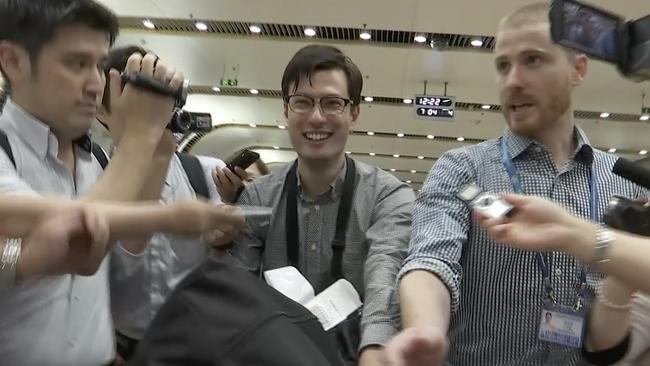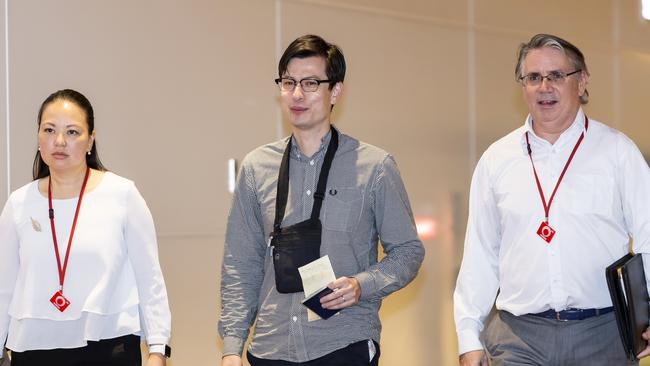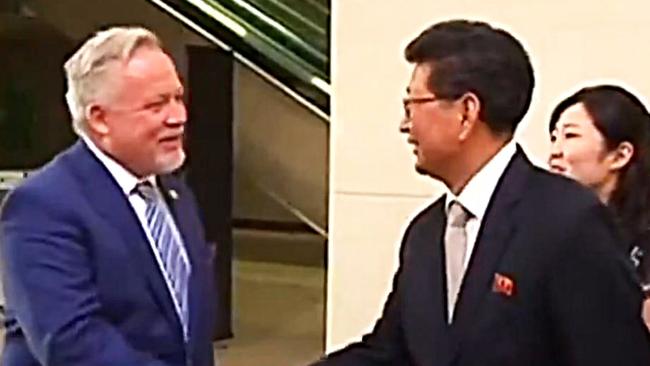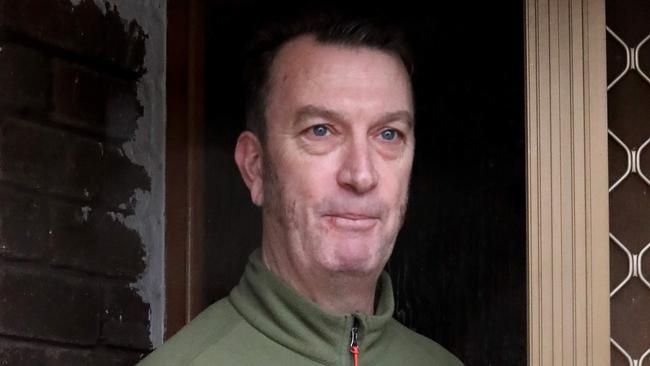North Korea rescue bid for Alek Sigley began after G20 dinner
As world leaders gathered in Osaka, a careful diplomatic effort to free Alek Sigley was hatched.

As Scott Morrison left dinner with Donald Trump on the eve of the G20 world leaders’ summit in Osaka last Thursday, he would have had something a little closer to home on his mind.
Australian student Alek Sigley was feared lost or detained — or worse — in North Korea, and Pyongyang was stonewalling.

The 29-year-old, who also worked as a tour guide in Pyongyang, would normally contact his Perth-based parents every day. But by the time of the meeting between the US President and the Prime Minister, Mr Sigley had been off the air for almost three days. By the following day, Mr Morrison had upped the ante.
He first engaged in “deep discussions” with South Korean President Moon Jae-in on the sidelines of the G20, which was being held against the backdrop of deepening trade tensions between the US and China.
Mr Morrison was then approached by Japanese Prime Minister Shinzo Abe, with the offer of assistance. Momentum was growing for a full-force diplomatic intervention.
Hours later, Australian and US officials held direct talks over what could be done to locate Mr Sigley, and force his release.

It has since been suggested that US officials may have subsequently raised it in passing during Sunday’s historic meeting between Mr Trump and North Korean dictator Kim Jong-un at the demilitarised zone between the two Koreas, although this has not been confirmed. In the end it was a Swedish mission that played the lead role in liberating Mr Sigley.
Australia has no diplomatic mission in North Korea and relies on the Swedes if issues arise in the hermit kingdom. Two days ago, the Swedish government sent a delegation of seven diplomats, headed by special envoy Kent Harstedt, to Pyongyang to determine where Mr Sigley was and if he was being detained.
Mr Harstedt, a survivor of the 1994 MS Estonia maritime disaster, is a skilled politician who has met several times with North Korea’s Foreign Minister Ri Yong-ho as part of his country’s efforts to denuclearise the Korean peninsula. A video of the Swedish envoy’s arrival in Pyongyang shows a warm and deferential Mr Harstedt in a lengthy handshake with a North Korean official, telling him: “It’s a pleasure to be back here. We bring a big delegation this time.”
Within hours, the delegation received confirmation that Mr Sigley had been detained but it is understood that Mr Harstedt established that the reason for his detention was “not significant”.
This immediately raised hopes of securing Mr Sigley’s release.

By midmorning yesterday, the Swedish ambassador in Seoul was advised there was a strong possibility that the North Koreans were set to release the Australian.
The delegation drove to Pyongyang airport, where it was greeted by North Korean officials who allowed Mr Sigley to leave the country on the next flight to China in the company of the Swedes. Yesterday afternoon, he arrived in Beijing, after more than a week in detention. “I’m OK, I’m OK. I’m good, I’m very good,” he said as Mr Harstedt accompanied him to a waiting car.
Moments later, Mr Morrison rose in parliament to confirm that Mr Sigley was safe and well.
“On behalf of the Australian government I would like to extend my deepest gratitude to the Swedish authorities for their invaluable assistance in securing Alek’s prompt release, which demonstrates the value of discreet behind-the-scenes work by officials in solving sensitive consular cases in close partnership with other governments.”
Last night, Mr Sigley took a call from Mr Morrison, and the pair spoke for several minutes.
The reasons for Mr Sigley’s detention remain unclear.
The former ANU student had been respectfully — some say admiringly — documenting life in North Korea on his blog up until he went missing last week.
Mr Sigley claimed to be the only Australian living in North Korea. Until last week he was studying a masters in Korean literature at Kim Il-sung University. He is an avid fan of North Korean food and promoted the country’s culture online and through his business Tongil Tours. In Korean, Tongil means unification or reunification. He was raised in a household with strong links to Asia. His father Gary is a professor of Chinese language and Asian studies and his mother was born in China.
One of the first things Mr Sigley did upon his liberation was to call his father. But Professor Sigley had gone to the shops without his phone, and missed the call from his son. He later emerged briefly from his Perth home to say he and his wife looked forward to giving their son a big hug.
Late last night, Mr Sigley arrived in Japan to be reunited with his wife, Yuka Morinaga, 26, a computer programmer. They married in Pyongyang in May last year.
North Korea watcher Gordon Flake said Mr Sigley had “dodged a bullet”. The mission to get him out of North Korea was handled “carefully and professionally by diplomats, the family and all involved”.



To join the conversation, please log in. Don't have an account? Register
Join the conversation, you are commenting as Logout